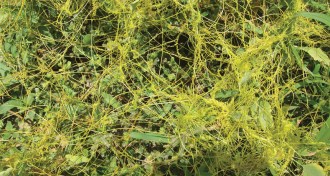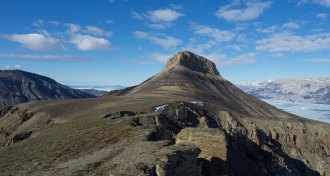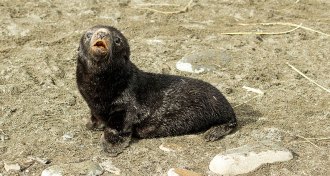Earth
Sign up for our newsletter
We summarize the week's scientific breakthroughs every Thursday.
-
 Plants
PlantsHow a tomato plant foils a dreaded vampire vine
Tomatoes can foil a dodder plant attack by getting scared and scabbing over.
By Susan Milius -
 Animals
AnimalsWays to beat heat have hidden costs for birds
Birds that look as if they’re coping with heat waves and climate change may actually be on a downward slide, with underappreciated disadvantages of panting and seeking shade.
By Susan Milius -
 Oceans
OceansLack of nutrients stalled rebound of marine life post-Permian extinction
Warm sea surface temperatures slowed the nitrogen cycle in Earth’s oceans and delayed the recovery of life following the Permian extinction, researchers propose.
-
 Animals
AnimalsEvidence piles up for popular pesticides’ link to pollinator problems
Neonicotinoid pesticides linked to population declines in California butterflies and wild bee extinctions in Great Britain.
-
 Earth
EarthAmericas’ hookup not so ancient after all
Debate lingers over when the Isthmus of Panama formed and closed the seaway that separated North and South America millions of years ago.
-
 Earth
EarthGeneral relativity has readers feeling upside down
Readers respond to the June 25, 2016, issue of Science News with questions on Earth's age, moaning whales, plate tectonics and more.
-
 Environment
EnvironmentNew desalination tech could help quench global thirst
Designed with better, more energy-efficient materials, next-generation desalination plants may offer a way to meet the world’s growing need for freshwater.
-
 Climate
ClimateIndia’s monsoon winds trace back nearly 13 million years
The intense monsoon winds that carry torrential rain to India each year first started blowing around 12.9 million years ago, new research suggests.
-
 Science & Society
Science & SocietySea life stars in museum’s glass menagerie
See Leopold and Rudolf Blaschkas’ delicate glass jellyfish, anemones, sea worms and other marine invertebrates at the Corning Museum of Glass.
-
 Earth
EarthChina’s mythical ‘Great Flood’ possibly rooted in real disaster
Folktales of an ancient flood that helped kick off Chinese civilization may reference a nearly 4,000-year-old deluge.
By Bruce Bower -
 Paleontology
PaleontologyWoolly mammoths’ last request: Got water?
Woolly mammoths survived on an Alaskan island thousands of years after mainland mammoths went extinct. But they died out when their lakes dried up, thanks to a warming climate and rising sea levels.
-
 Animals
AnimalsPup kidnapping has a happy ending when a seal gets two moms
A female fur seal kidnapped another seal’s pup. But this turned out to be a positive the young seal, scientists found.